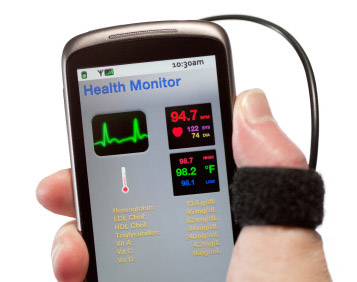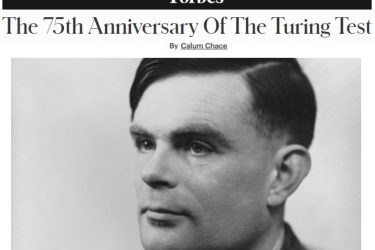 Eric Topol is a techno-optimist and a leading advocate of radical change in the medical profession. Judging by some of the reactions to this best-selling book, parts of that profession see him as a traitor.
Eric Topol is a techno-optimist and a leading advocate of radical change in the medical profession. Judging by some of the reactions to this best-selling book, parts of that profession see him as a traitor.
Smartphone revolution
One of the two main themes in Topol’s latest book is that the AI embedded in our smartphones is about to spark a revolution in healthcare. Paired with tiny sensing devices and accessing ever-increasing amounts of data, smartphone apps enable patients to monitor every aspect of our bodies. Diagnoses can be made and prescriptions issued without us having to physically visit the doctor’s surgery, or set foot inside the perilous environments known as hospitals.
Medical paternalism
In other words, Topol is pointing out that the digital revolution which is sweeping across all industries and organisations will lead to big changes in healthcare too. This should probably be an uncontroversial observation, but of course healthcare is different from other industries. There are good reasons why it is conservative and heavily regulated, but Topol’s other big theme is that the healthcare profession is paternalistic and patronising. Doctors are convinced they always know best, and the rest of us are “patients” – people who must wait, rather than “customers” or “clients” who are actively involved in the management of our own health. Generally, we cannot even be trusted to see our own healthcare data, much less direct what is done with it. This attitude, Topol argues, started way back with Hippocrates, and today, he complains, MD stands for Medical Deity; instead of evidence-based medicine we have “eminence-based medicine”.
 In every other industry, technology drives down costs and consumers are considered perfectly capable of making decisions for themselves. But many doctors believe that medical information is uniquely hard for ordinary people to understand, and we will become stressed and harder to treat when (not if) we mis-interpret it.
In every other industry, technology drives down costs and consumers are considered perfectly capable of making decisions for themselves. But many doctors believe that medical information is uniquely hard for ordinary people to understand, and we will become stressed and harder to treat when (not if) we mis-interpret it.
Superior diagnosis
Topol is confident that in time, the clinicians’ resistance to the digital revolution will be swept aside because the benefits of the digital revolution are irresistible. For instance, he points to an impressive range of tests which can be taken with the assistance of smartphones:
 “There are now wearable wireless sensors, either commercially available or in clinical development, to capture physiologic data on a smartphone. This includes blood pressure, heart rhythm, respiratory rate, oxygen concentration in the blood, heart rate variability, cardiac output and stroke volume, galvanic skin response, body temperature, eye pressure, blood glucose, brain waves, intracranial pressure, muscle movements, and many other metrics. The microphone of the smartphone can be used to quantify components of lung function and analyze one’s voice to gauge mood or make the diagnosis of Parkinson’s disease or schizophrenia. One’s breath can be digitized to measure a large number of compounds, such as nitric oxide or organic chemicals … Testing saliva, there is the capability to detect strains of the influenza virus and strep throat.”
“There are now wearable wireless sensors, either commercially available or in clinical development, to capture physiologic data on a smartphone. This includes blood pressure, heart rhythm, respiratory rate, oxygen concentration in the blood, heart rate variability, cardiac output and stroke volume, galvanic skin response, body temperature, eye pressure, blood glucose, brain waves, intracranial pressure, muscle movements, and many other metrics. The microphone of the smartphone can be used to quantify components of lung function and analyze one’s voice to gauge mood or make the diagnosis of Parkinson’s disease or schizophrenia. One’s breath can be digitized to measure a large number of compounds, such as nitric oxide or organic chemicals … Testing saliva, there is the capability to detect strains of the influenza virus and strep throat.”
 Testing patients “in the wild”, as Topol puts it, and gathering data (“digital breadcrumbs”) over time, monitoring the impact of drugs, food, exercise, and stress is a better route to diagnosis and prescription than waiting around in the surgery (for an average of 62 minutes in the US, apparently) to get into the exam room and be seen by a doctor for a few minutes. Or rather, not be seen, because the doctor is busy looking at her keyboard to type information into the electronic medical record which we patients are not allowed to see.
Testing patients “in the wild”, as Topol puts it, and gathering data (“digital breadcrumbs”) over time, monitoring the impact of drugs, food, exercise, and stress is a better route to diagnosis and prescription than waiting around in the surgery (for an average of 62 minutes in the US, apparently) to get into the exam room and be seen by a doctor for a few minutes. Or rather, not be seen, because the doctor is busy looking at her keyboard to type information into the electronic medical record which we patients are not allowed to see.
Credibility and credit
Topol is carving out a niche for himself as the US’ foremost clinician-turned-revolutionary. He is a practicing cardiologist, and professor of genomics at La Jolla, California. His books have received plaudits from politicians and the media, but brickbats from many of his colleagues. This one is a little rambling and repetitive in places, but it is both authoritative and important.
TL;DR
 The go-to book on how AI will impact healthcare.
The go-to book on how AI will impact healthcare.



